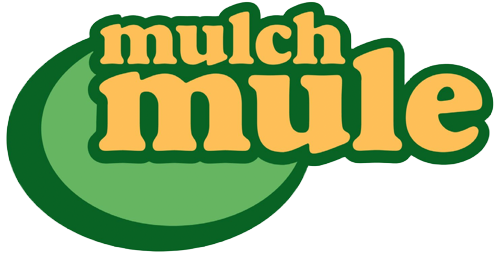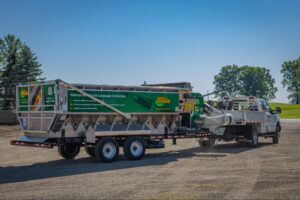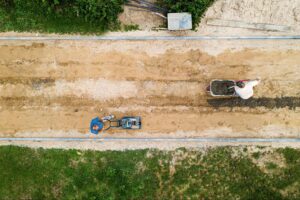The future of landscaping remains uncertain amid shifting market dynamics and evolving customer expectations. Success in this field increasingly depends on innovative approaches and strategic planning. Adaptability and a proactive mindset can help businesses effectively manage operational challenges and leverage emerging opportunities.
To remain competitive and maximize revenue, landscaping businesses must optimize operations, invest in year-round tools, and explore new service opportunities. Innovative equipment like the Mulch Mule plays a central role in these efforts, streamlining labor-intensive tasks, increasing safety, and accelerating project completion.
This article outlines actionable insights into key revenue opportunities that can support long-term success. By embracing efficiency, diversifying services, and leveraging modern equipment, companies can position themselves for sustainable progress in an ever-changing market.
3 Key Revenue Opportunities for Landscaping Business Profitability
Identifying and capitalizing on the most profitable areas is crucial. In today’s lawn and landscaping industries, three primary revenue opportunities are particularly worth considering.
1. Diversifying Service Offerings
Expanding your range of services is an effective way to generate additional revenue. Offering a diverse suite of year-round services not only attracts a broader client base but also helps stabilize income during slower periods. In addition to traditional lawn care, businesses can explore mulching, debris removal, seasonal cleanups, and hardscaping.
Targeting a wide range of clients—from residential properties to commercial accounts—can lead to steady, long-term relationships. Similarly, partnering with professional landscaping associations can offer ongoing training, certifications, and networking opportunities, further strengthening your credentials. By providing comprehensive solutions, your company can become a one-stop shop for landscaping needs, increasing customer loyalty and overall value.
2. Optimizing Material Handling for Efficiency
Efficient material handling is key to profitability, especially when managing materials such as mulch, soil, or gravel. Manual labor can be slow, costly, and pose a higher risk of injuries. Investing in advanced equipment can markedly improve both operational speed and safety.
For instance, equipment like the Mulch Mule trailer automates loading, unloading, and material distribution. Its efficient live floor system speeds up tasks that once took considerably longer, minimizes waste, and boosts overall operational efficiency during mulch distribution and soil delivery. By reducing physical strain on workers, companies can also avoid employee burnout and lower compensation costs.
3. Targeting High-Value Clientele
Focusing on clients with consistent, high-volume landscaping needs can significantly boost revenue. Commercial properties – as well as larger organizations such as homeowners associations – often require reliable contractors who can deliver prompt, quality service. Demonstrating your ability to manage large-scale projects efficiently using advanced equipment helps position your business as a dependable partner for significant projects. Tailoring your services to meet the specific needs of these high-value clients can open up opportunities for securing premium contracts and establishing lasting relationships.
The Cost-Saving and Efficiency Benefits of Advanced Landscaping Tools
Modern landscaping equipment is essential not only for reducing labor costs but also for enhancing overall productivity and the quality of finished work.
Minimizing Labor Costs and Boosting Productivity
Labor costs account for a major portion of landscaping expenses. Investing in advanced equipment reduces reliance on manual labor, allowing staff to focus on specialized tasks. Tools that automate material handling can lessen physical strain, lower the risk of injuries, and reduce workers’ compensation expenses. As a result, projects can be completed more quickly and safely, enabling companies to take on additional work without sacrificing quality or employee well-being.
Streamlining Operations for Faster Job Completion
Inefficient processes can delay project timelines and increase expenses. Automating routine functions like bulk material distribution dramatically enhances jobsite productivity. Faster overall completion times not only please clients but also allow businesses to expand their workload capacities, increasing short- and long-term revenue potential. Embracing innovative solutions in material handling leads to robust efficiencies and better allocation of manpower.
Prioritizing Safety and Worker Well-Being
Reducing physical strain on employees is crucial for maintaining a safe work environment. Advanced tools designed to minimize strenuous tasks help in reducing injury risks. By continuously investing in employee training and adhering to OSHA guidelines, businesses reinforce a culture of safety and efficiency on every jobsite. This attention to employee well-being elevates the company’s reputation as a responsible employer.
The Role of the Mulch Mule in Enhancing Productivity

The Mulch Mule serves as an example of how modern equipment can transform traditional landscaping practices by offering tangible benefits in efficiency and safety.
Efficient Live Floor System for Faster Material Discharge
At its core, the Mulch Mule features a live floor system designed for precise and uniform material discharge. Tasks that once took significant periods can now be rapidly completed, reducing overall time spent on distributing mulch or soil. By enhancing speed and precision, companies can offer faster turnarounds and consistency in landscaping quality.
Curb-Side Functionality and Space-Conscious Design
The Mulch Mule’s practical design is especially beneficial for confined spaces such as residential streets or busy commercial sites. Its controlled release of materials minimizes manual adjustments and disturbances at the jobsite. This streamlined approach is a boon in areas where space is limited and efficient operations are crucial for completing a job seamlessly.
Year-Round Versatility to Maximize Productivity
Engineered to perform under a variety of weather conditions, the Mulch Mule is designed for year-round versatility. Whether handling heavy leaf accumulation in the fall or supporting bulk material distribution during peak growing seasons, its adaptability ensures it remains a valuable asset for landscaping contractors working under diverse climatic conditions.
Transforming Traditional Landscaping Practices
Conventional material handling methods can be laborious and time-consuming. By automating repetitive tasks, equipment like the Mulch Mule minimizes inefficiencies, reduces worker fatigue, and allows teams to concentrate on higher-value tasks. This not only speeds up project execution but also expands the overall capacity for new jobs, broadening potential revenue streams.
Building a Competitive Operational Model
Integrating advanced equipment such as the Mulch Mule into daily operations optimizes service delivery, cost management, and safety measures. By streamlining processes, businesses can differentiate themselves from competitors still dependent on traditional methods. A forward-thinking, well-equipped operation is better positioned to secure contracts and sustain profitability in a dynamic market.
Potential Drawbacks and Considerations
While the Mulch Mule is celebrated for enhancing jobsite efficiency, businesses should consider a few practical points. The initial investment may be a constraint for smaller operations or newcomer companies with limited budgets. Furthermore, employees might require training to ensure safe and effective usage, which can temporarily divert resources from other tasks. Ongoing maintenance is essential—consistent upkeep is critical to prevent unexpected downtimes that might impact scheduling and profitability. However, many landscaping businesses find that long-term savings and productivity improvements offer a compelling return on investment.
For a live demonstration and localized representation, many contractors explore the Mulch Mule ambassador network to experience its benefits firsthand. Additionally, specialized attachments and upgrades can further enhance the tool’s versatility, and ready access to parts and warranty services ensures its continued reliability.
Emerging Landscaping Industry Trends
Staying current with industry trends is essential for maintaining a competitive advantage. Several key developments are shaping the future of landscaping.
Increased Automation in Landscaping Operations
Automation continues to reshape the sector. From robotic mowers to sophisticated material handling systems, automated solutions are proving indispensable. Equipment that reduces labor demands while enhancing jobsite efficiency helps companies complete projects faster and with fewer errors, encouraging client loyalty and word-of-mouth referrals.
Growing Demand for Environmentally Sustainable Practices
Sustainability is emerging as a major differentiator, with clients increasingly favoring energy-efficient and eco-friendly solutions. Tools that promote precision, reduce waste, and lower operational costs support environmental goals while enhancing business profitability. Adopting sustainable practices not only benefits ecosystems but also appeals to an eco-conscious clientele.
Workforce Safety and Morale as a Competitive Advantage
Prioritizing worker safety is critical in physically demanding industries. Modern equipment that minimizes manual strain contributes significantly to a safer, more productive work environment. A company that demonstrates a strong commitment to safety is likely to see improved employee morale and productivity, an advantage that resonates with clients.
Rising Expectations for Speed and Quality
Today’s clients value rapid project turnaround times paired with exceptional quality. Achieving faster delivery without compromising quality is greatly facilitated by equipment that automates labor-intensive tasks. This blend of speed and quality is key to securing repeat business and positive referrals.
Actionable Strategies for Maximizing Profitability
To capitalize on evolving revenue opportunities, strategic planning and smart investments are essential. Consider the following guidelines to drive profitability.
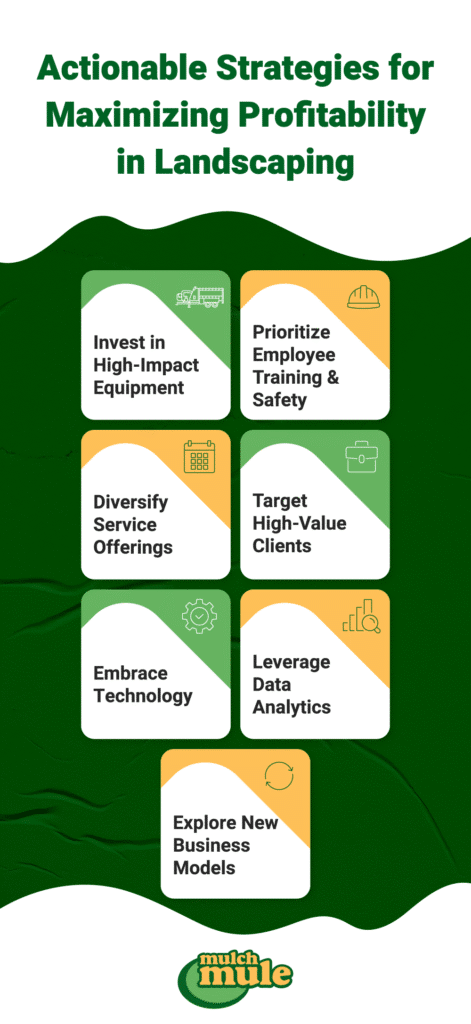
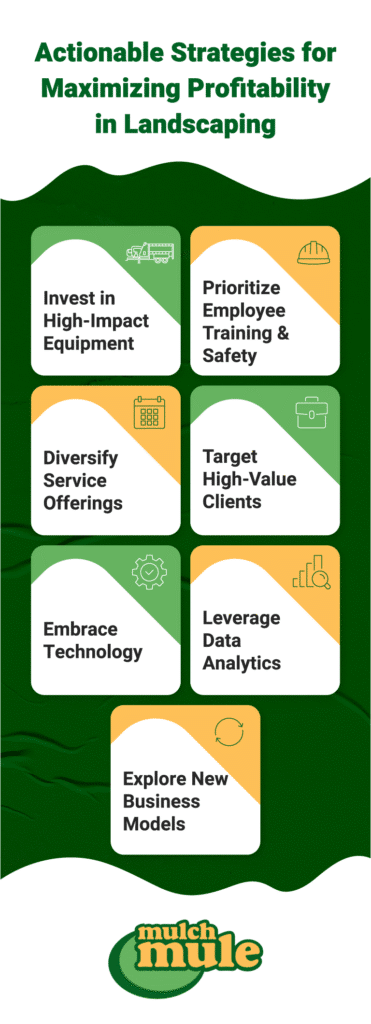
Invest in High-Impact Equipment
Modern, high-impact landscaping tools can dramatically enhance operational efficiency. When evaluating equipment purchases, consider both initial costs and long-term value in reduced labor demands and increased capacity. Embracing energy-efficient equipment also supports sustainability goals, presenting a modern image that resonates with eco-conscious clients.
Prioritize Employee Training and Safety
A well-trained team is vital for operating new tools safely and effectively. Beyond simple orientation, continuous education and skill development can prevent accidents and equipment mismanagement. This investment fosters a culture centered on quality and safety, reducing downtime and boosting productivity over time.
Diversify Service Offerings to Match Market Demand
Expanding your portfolio to include seasonal and value-added services—such as leaf and debris collection or midseason lawn renovations—can attract a diverse client base, helping to maintain a steady revenue flow even during off-peak times.
Target High-Value Clients with Tailored Solutions
Securing contracts with clients that have large-scale or frequent landscaping needs—such as commercial properties and municipal accounts—can greatly amplify profitability. By emphasizing reliability, efficiency, and professionalism, your company can differentiate itself, laying the groundwork for premium contracts and future business growth.
Embrace Technology and Stay Ahead of Industry Trends
Keeping abreast of emerging technologies ensures that your company remains a market leader. Advanced equipment, automated scheduling, and analytics platforms can optimize operations and help build a brand that is ready for future challenges.
Leverage Data Analytics for Informed Decision-Making
Tracking key metrics like material usage, project turnaround times, and labor costs can identify inefficiencies and drive precise improvements. Data insights enable strategic spending and systematic operation scaling—both imperative for long-term success.
Explore New Business Models
Innovative business models can generate consistent revenue while maintaining high customer satisfaction. For example, subscription-style maintenance packages offer clients predictable service plans and steady monthly income. Bundling services such as routine mowing, mulching, and seasonal property cleanups can also simplify management while ensuring year-round income.
Long-Term Benefits of Embracing Innovation in Landscaping
Investing in technology and innovative practices yields immediate operational benefits and long-lasting sustainability.
Preparing for the Future with Technology
Adopting advanced tools helps ensure your business remains agile in the face of market changes. A well-equipped operation can adjust pricing, boost jobsite productivity, and expand service lines when challenges arise.
Strengthening Your Reputation for Operational Excellence
Delivering reliable, high-quality services demonstrates commitment to both customers and employees. A proven track record of on-time, on-budget project completion builds a reputation that attracts future clients—from local municipalities to large commercial enterprises.
Unlocking Growth Through Continuous Innovation
Ongoing innovation drives expansion, allowing your company to tackle more complex projects while diversifying service offerings. Each technological advancement, whether in material transport or job planning software, creates a competitive advantage and opens the door to premium contracts.
Innovative Business Models in the Landscaping Sector

Forward-thinking landscaping companies are exploring creative business models and partnerships to enhance revenue and customer engagement. One effective approach involves forming alliances with local mulch suppliers or material yards to secure bulk rates. These partnerships can lower material costs, enabling more competitive bids and healthier profit margins.
Subscription-based service packages are also gaining popularity. These structured plans provide customers with predictable fees and ensure consistent property care. By segmenting services—such as routine mowing, mid-season mulching, fall leaf removal, and winter preparation—landscapers can generate reliable, year-round income streams. Coupled with modern tools like the Mulch Mule, these models help maintain high efficiency and customer satisfaction.
Navigate an Evolving Industry Landscape with Mulch Mule
The pathway to landscaping profitability hinges on strategic planning, flexible service models, and the smart integration of new technologies. Businesses that invest in modern equipment, diversify their service portfolios, and remain agile in response to evolving trends are well-positioned for stable growth.
The Mulch Mule exemplifies how innovation can optimize traditional practices—streamlining labor-intensive tasks while enhancing safety and efficiency. To learn more about how the Mulch Mule can transform your landscaping operations and boost profitability, explore video demonstrations and reach out to our team for a quote. Embracing innovation and equipping your team with best-in-class technology lays a solid foundation for sustained growth.
